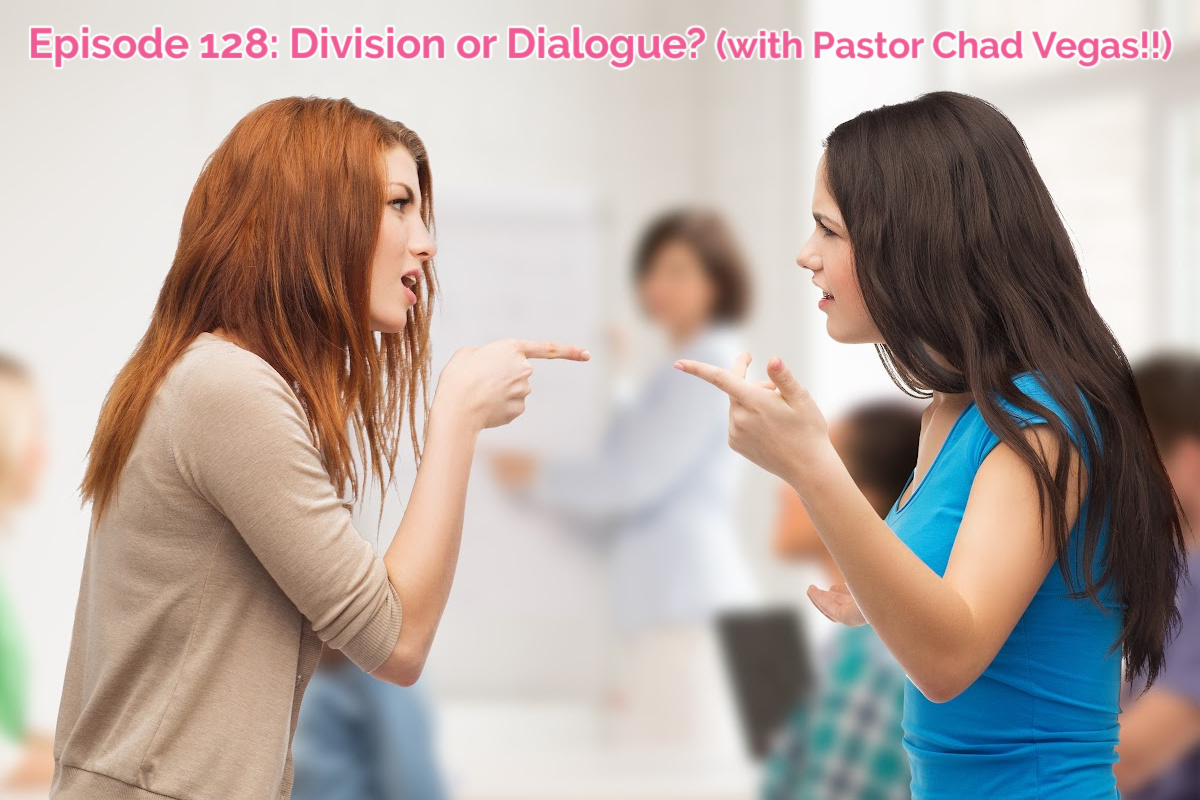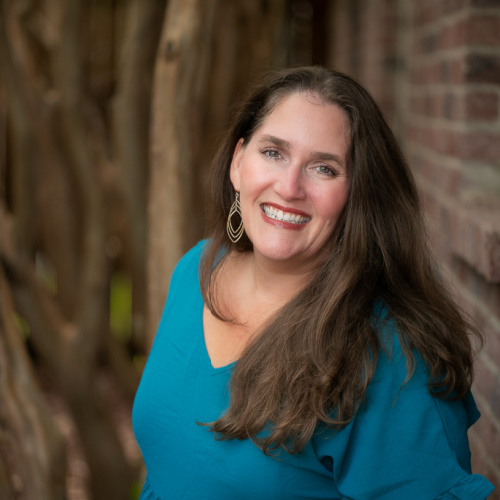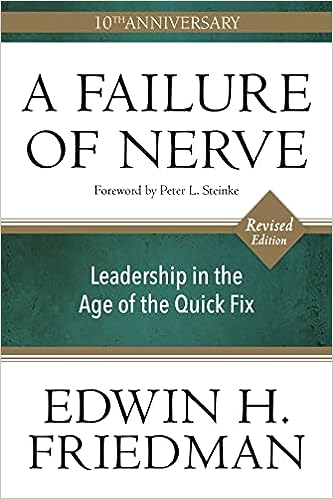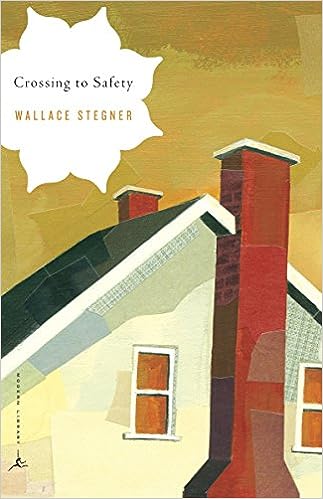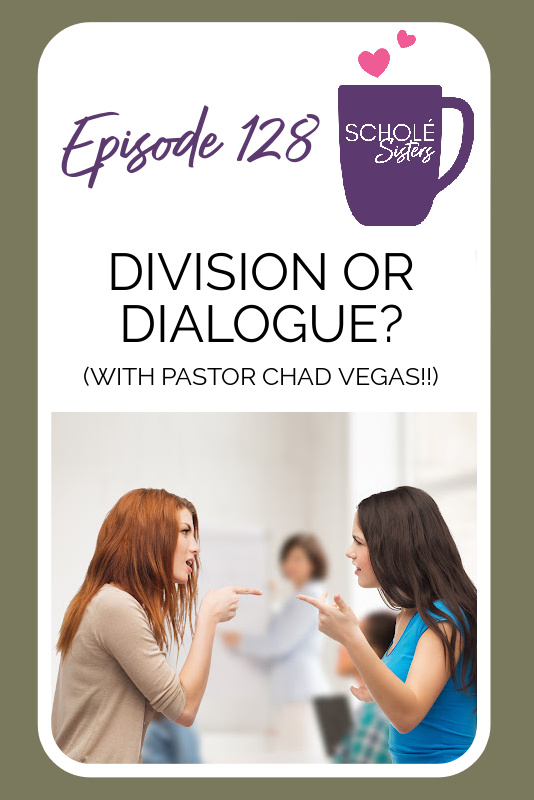SS #128 – Division or Dialogue? (with Pastor Chad Vegas!!)
We brought on Brandy’s pastor to explain to us the implications of the number one Scriptural passage used to shut down controversial conversations: Matthew 18:15-20.
We have seen this passage used and abused many times, and we want to moderate conversation appropriately and biblically, not only in this podcast where we occasionally make public comments about other people’s public statements, but also inside Scholé Sistership, a social media network for classical homeschooling moms.
We really DO want to hold ourselves and by extension our members to the correct standard, but it can be confusing about what that standard is because of how misused the passage is.
Listen to the podcast:
TUNE IN:
Apple Podcasts | Spotify | Stitcher
Arguments aren’t always bad
Today’s Hosts
Today’s Guest
Chad Vegas is the founding pastor of Sovereign Grace Church in Bakersfield, CA, where he has served since 2006. Chad received his M.A. from Talbot School of Theology. He also spent nearly two decades in public school education as both a teacher and Board Member. He has been married to Teresa since 1994 and they have 2 children. Chad is the co-author of Missions by the Book: How Theology and Missions Walk Together, available at all major booksellers.
“You’re commanded to love the world,
not to get the world to love you.”
— Pastor Chad Vegas
Scholé Every Day: What We’re Reading
Crossing to Safety, William Stegner
Mystie lost herself in this rich and deep modern novel which gives a picture of marriage through contrast.
City of God, Augustine
Pastor Chad is reading City of God in the “translation for the twenty-first century” by William Babcock.
Socrates’ Children, Peter Kreeft
Pastor Chad says this series would be a great introduction to philosophy for high schoolers.
Failure of Nerve, Edwin H. Friedman
From this title Brandy is getting intellectual backup for insisting that behaviorism techniques do not accomplish effective classroom management.
What kind of process is Matthew 18 for?
Matthew 18 is the proper, biblical procedure Jesus outlines for handling someone who sins against you. Although the point is restoration of fellowship, the process culminates in excommunication.
Someone espousing an opinion you disagree with is not sinning against you. If the opinion was privately shared and you publicly denounce it, you’d be out of line. But if you’re engaging with a public conversation publicly, disagreement ought not even necessarily be conflict.
Actually, public false teaching is supposed to be called out publicly instead of privately, as we can see with Paul calling out Peter, as well as all the Old Testament prophets. However, tertiary issues and even secondary issues can be discussed without sin in public.
Matthew 18 is the process for starting the wheels of church discipline. Is that the appropriate outcome for the situation if the person does not repent? If your disagreement is not resolved privately, would the next step be to get an elder involved with witnesses?
When arguments hurt
Being made uncomfortable is not being sinned against.
Being questioned is not being sinned against.
Having someone disagree with you is not being sinned against.
Seeing someone say something wrong on the internet is not being sinned against.
The assumptions that would cause personal hurt if someone questions you or calls you out (or if you’re hurt on someone else’s behalf) is the postmodern belief that truth is subjective and personal.
Attacking an idea is not attacking the person. Having a spirited and lively back-and-forth without personal insults is not interpersonal conflict. It only would be if truth was one with the person.
Free to challenge someone
Scripture is the ultimate authority, the standard we hold. It informs our consciences and we each may read and be informed by the Scripture individually with freedom of conscience.
The implication is that it is legitimate to question someone’s teaching. It is not necessarily subversive or arrogant to disagree with anyone. We have no Christian duty to subscribe to whatever someone above us teaches. Instead, we have a Christian duty to be Bereans, studying Scripture to verify and mature our own opinions.
Credentials do not automatically mean someone is telling the truth. Someone else’s position does not make them infallible.
What is it to be divisive?
We seem to have a presumption in social media that questioning something someone says is being divisive. But speaking first publicly does not make you automatically the non-divisive one.
A lot of people get on social media and they act like they’re drunk, saying things to people they would never say to their face unless they had too much to drink.
Chad Vegas
It’s the one rejecting truth, not telling truth that is divisive.
Do you want to have an iron-sharpening-iron discussion where both parties come away closer to wisdom? Do you want to win your brother because you love him? Or do you want to prove you are right and win the argument, not the brother?
Fear of others’ different choices is insecurity
When we are uncomfortable, uncertain, insecure in our own choices, we can feel like someone else making a different choice — in curriculum, in schooling, in churches, in dress — is a subtle critique and contradiction of our own choices.
It’s actually that family’s wisdom call. You make yours. Let them make theirs. Have open conversation without expecting that agreement means everyone doing the same thing.
When you share what works for you, do you want to help people or do you want affirmation and confirmation of your own choices?
Listen to related episodes:
SS #47: Rightly Dividing (with Karen Glass!!)


